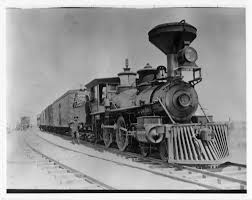locomotive
英 [ˌləʊ.kəˈməʊ.tɪv]
美 [ˌloʊ.kəˈmoʊ.t̬ɪv]
- adj. 火车头的;运动的;移动的
- n. 机车;火车头
使用频率:

记忆方法
将“locomotive”分解为“loco”和“motive”。想象一个“loco”(类似“locust”,意指跳跃的)机器,它的“motive”(动机或动力)是推动前进。这种方法帮助将单词的两个部分结合起来,形成一种动态和推动力的视觉图像,从而帮助记忆。
以上内容由AI生成, 仅供参考和借鉴
中文词源
locomotive 移动的,火车头
来自locomotion,移动,运动,引申词义机车,火车头。
英语词源
- locomotive
-
locomotive: [17] Locomotive denotes etymologically ‘moving by change of place’. It is an anglicization of modern Latin locōmōtīvus, a compound formed from locus ‘place’ and mōtīvus ‘causing to move’ (source of English motive). Originally it was used strictly as an adjective, and it was not until the early 19th century that the present-day noun use (which began life as an abbreviation of locomotive engine) emerged.
- locomotive (adj.)
- 1610s, "pertaining to movement," from French locomotif, from Latin loco "from a place" (ablative of locus "place;" see locus) + Late Latin motivus "moving" (see motive). The noun meaning "railroad engine" is from 1829, short for locomotive engine (1814).
权威例句
- 1. The Locomotive Construction Company Ltd is a wholly-owned subsidiary of the Trust.
- 机车建筑有限公司是该托拉斯的全资子公司。
- 2. He was killed by an onrushing locomotive.
- 他被飞驰而来的火车头撞死了。
- 3. A group of enthusiasts have undertaken the reconstruction of a steam locomotive.
- 一群火车迷已担负起重造蒸汽机车的任务.
- 4. At the conductor's whistle the engine - driver starts his locomotive - engine.
- 乘务员哨声一响,司机开动机车.
- 5. The locomotive has broken down.
- 火车头坏了.
